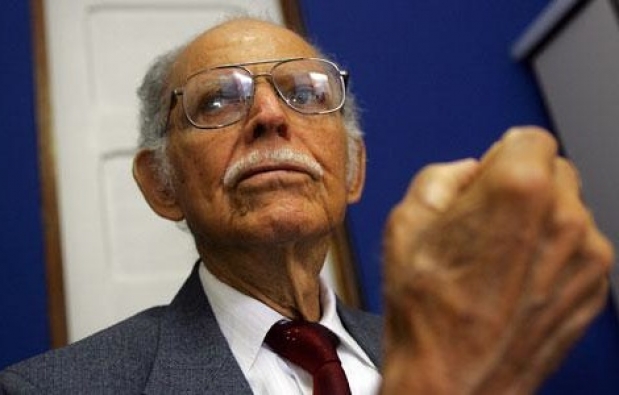
Former commander of the Cuban revolution Huber Matos Benítez, one of the most important figures of the opposition to the regime of the Castros, died early Thursday morning in a Miami hospital, reported his organization Independent and Democratic Cuba (CID). He was 95.
Matos (born in Yara, Granma province, on November 26, 1918) had been admitted two days earlier to Kendall Regional Hospital “where he was diagnosed with a massive heart attack” according to the CID report.
“On the 26th he asked to be disconnected from breathing equipment because he wanted to say farewell to his wife María Luisa Araluce, his children and grandchildren,” it added.
The organization said that during his hospitalization Matos received call from Cuba from the principal leaders of his party, “who affirmed that the organization would not rest until the island was free.”
According to CID, shortly before he died Matos declared “The fight goes on. Long live free Cuba!”
There will be a wake in Miami next Sunday for the former commander, who participated in the struggles that brought Fidel Castro to power and then spent 20 years in prison on the island for dissenting from the direction that the regime took.
CID said that Matos requested that his body be taken to Costa Rica, the country that welcomed him when he was first exiled in 1957 and from which he went to the Sierra Maestra to join Fidel Castro’s men.
Costa Rica was also Matos’s first destination in 1979 when he was released after serving two decades of political imprisonment imposed by the regime.
“I want to make my trip back to Cuba from the same land whose people always showed me solidarity and affection; I want to rest on Costa Rican soil until Cuba is free and from there to Yara, to rejoin my mother and my father and all Cubans,” Matos explained about his wishes.
Huber Matos, a school teacher, opposed the dictatorship of Fulgencio Batista. He was captured in 1957 for participating in operations providing logistical support to the rebels who were in the Sierra Maestra, but managed to escape into exile in Costa Rica.
In the Central American country he gathered weapons that arrived on a cargo plane in the Sierra Maestra and were instrumental in the offensive against Batista’s troops.
Because of his courage and leadership, Matos was the rebel who rose fastest through the ranks to commander, as head of the Antonio Guiteras 9th Column, in charge of the positioning, surrender, and capture of the city of Santiago de Cuba.
In 1959 he was named Commander of the Army in Camaguey province. Having discussed several times with Fidel Castro the increasing alignment of the revolution with communism, he resigned, stating that this was a betrayal of the democratic principles that the Revolution had promised the Cuban people. In response, Castro ordered his arrest on October 21, 1959, a week before the mysterious disappearance of Camilo Cienfuegos, who according Matos shared his concerns.
Matos was subjected to a summary trial for sedition in December 1959. During the process, he insisted on denouncing the deviation from the goal of the revolutionary movement for which he and others had risked their lives.
He was sentenced to twenty years in prison, which he served in full.
In exile, Matos tirelessly denounced the betrayal by the Castro regime.
In 1980 in Caracas he founded Independent and Democratic Cuba, with social democratic leanings, today headquartered in Miami, and claiming activists throughout the island.
In his autobiography How Came the Night, which, according to CID has sold over 100,000 copies and that circulates clandestinely in Cuba, Matos recounts in detail his participation in the revolutionary army, his subsequent imprisonment and the tortures to which he was subjected.
Diario di Cuba, 27 February 2014
Translated by Tomás A.
